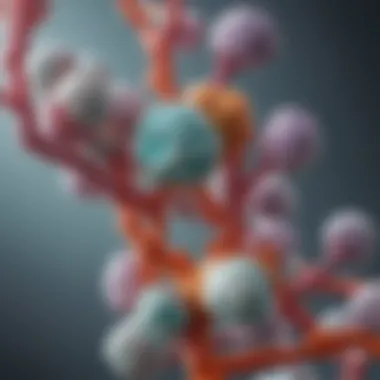Impact of Amiodarone on Thyroid Function and Health


Intro
The relationship between amiodarone and thyroid function presents a complex interplay that has garnered attention in the medical community. Amiodarone is widely prescribed for its effectiveness in managing various types of arrhythmias, yet it harbors significant implications for thyroid health. The very structure of amiodarone, a benzofuran derivative, consists of iodine atoms which contribute to its multifaceted effects on thyroid physiology.
While the drug excels in stabilizing heart rhythms, the adverse effects on the thyroid gland can lead to conditions like hypothyroidism and hyperthyroidism. These complications necessitate vigilant monitoring of both thyroid levels and overall patient wellbeing during amiodarone therapy.
Understanding the underlying mechanisms by which amiodarone influences thyroid function is crucial for clinicians and healthcare providers. It is essential to navigate the balance between treating cardiac issues and managing potential endocrine disturbances, thereby establishing a comprehensive protocol tailored to individual patient needs. Highlighting these connections underscores the importance of an interdisciplinary approach in patient management that integrates cardiology and endocrinology.
As we delve into this exploration, we will examine how amiodarone interacts biochemically within the body, the common thyroid disorders related to its use, and clinical strategies for monitoring and intervention. This discussion aims to enrich readers' knowledge, particularly for students, educators, and professionals, emphasizing the implications of this significant medication on thyroid function.
Preamble to Amiodarone and Thyroid Dynamics
Understanding the intricate relationship between amiodarone and thyroid function is crucial in today's medical landscape, especially for those involved in cardiology and endocrinology. The importance lies not only in the medication’s widespread use for treating arrhythmias but also in its profound effects on thyroid health. This section lays the groundwork for comprehending how amiodarone might influence thyroid physiology, ultimately shaping patient management and treatment considerations.
Overview of Amiodarone
Amiodarone is an antiarrhythmic drug that plays a vital role in managing various heart conditions, particularly atrial fibrillation. Its unique structure, rich in iodine, influences its pharmacological actions significantly. Unlike other antiarrhythmics, amiodarone impacts not just the heart but also disturbs thyroid function, often leading to a complex web of effects that healthcare providers must navigate. The drug's longevity in the system, due to its lipid solubility, exacerbates its influence and potential side effects, especially concerning the thyroid gland.
In practical terms, this means that a patient on amiodarone may experience alterations in their thyroid hormone levels, which can lead to conditions like hyperthyroidism or hypothyroidism. Understanding these dynamics is essential for healthcare professionals who prescribe this medication and need to monitor their patients' thyroid function vigilantly.
Importance of Thyroid Function
Thyroid hormones, primarily thyroxine (T4) and triiodothyronine (T3), are critical for several bodily functions, including metabolism, growth, and heart function. The thyroid gland’s ability to produce and regulate these hormones is crucial for maintaining homeostasis. When disruption occurs, as can happen with amiodarone use, it may result in a cascade of physiological changes, influencing everything from weight to energy levels and even heart rhythm.
The significance of maintaining proper thyroid function cannot be overstated. For instance, an excess of thyroid hormones can lead to symptoms such as weight loss, anxiety, and increased heart rate, while too little can result in fatigue, depression, and weight gain. Given amiodarone’s impact, understanding its effects on the thyroid is vital for healthcare providers.
Important Note: The relationship between amiodarone and thyroid function emphasizes the importance of regular monitoring, particularly for patients who are on long-term therapy. Understanding these interactions aids in preventing adverse outcomes and tailoring effective treatment strategies.
In summary, the exploration of amiodarone’s influence on thyroid dynamics is fundamental for optimizing treatment protocols and ensuring patient safety. As we delve deeper into this article, we will further examine the specific pharmacological properties of amiodarone, the nuances of thyroid physiology, and the clinical implications arising from their interplay.
Pharmacological Properties of Amiodarone
In understanding the impact of amiodarone on thyroid function, it is crucial to grasp its pharmacological properties. Amiodarone is not just an antiarrhythmic drug; it’s a complex medication that exhibits a range of biochemical interactions influencing not only cardiac health but also endocrine functions. Recognizing the nuances of its properties allows healthcare professionals to better administer treatment and anticipate potential complications that may arise related to thyroid health.
Mechanism of Action
Amiodarone works primarily by prolonging the cardiac action potential, which helps in stabilizing abnormal heart rhythms. This mechanism is startlingly multi-faceted. It blocks sodium channels, has inhibitory effects on adrenergic receptors, and can modulate potassium efflux. Each of these actions contributes to its ability to correct tachyarrhythmias.
However, there's more under the surface. A significant aspect of amiodarone's mechanism involves its iodine content. Nearly 37% of the drug consists of iodine, which plays a crucial role in the disruption of thyroid hormone synthesis. This high iodine content can lead to either hyperthyroidism or hypothyroidism, depending on the patient's underlying thyroid status prior to therapy. In essence, while the drug acts on the heart, it simultaneously sets off a cascade of events within the thyroid.
"Understanding amiodarone's actions reveals why it’s both a lifesaver for arrhythmias and a potential thorn in the side for thyroid health."
Pharmacokinetics and Pharmacodynamics


The pharmacokinetics of amiodarone further complicate its use and effects on thyroid function. Following oral administration, amiodarone undergoes substantial bioavailability, although it is highly lipophilic, which allows it to accumulate in tissues, especially in the liver, lungs, and thyroid. This accumulation can lead to prolonged effects, even after the cessation of the medication.
In terms of half-life, you’re looking at a significant range, emphasizing a slow release from tissue stores that can last weeks to months. When it comes to thyroid impact, these pharmacokinetic properties mean clinicians must remain attuned to the potential for delayed thyroid dysfunction that can arise long after stopping amiodarone treatment.
On the pharmacodynamic front, the interaction between amiodarone and thyroid hormone physiology is profound. The alteration of TSH (Thyroid Stimulating Hormone) levels or the feedback loop can lead to mixed and unpredictable outcomes—this is where the rubber meets the road in patient management. Amiodarone's ability to interfere with the typical mechanisms of thyroid hormone regulation makes thorough monitoring essential.
In summary, the pharmacological properties of amiodarone present a duality: it offers great potential in managing heart conditions but also carries a hefty responsibility regarding thyroid health. Understanding these intricacies makes a profound difference in managing patients on this medication.
Thyroid Physiology and Function
Understanding thyroid physiology and function is crucial for comprehending the intricate effects of amiodarone on thyroid health. The thyroid gland operates like a finely tuned instrument in the body, producing hormones essential for regulating metabolism, energy generation, and overall homeostasis. An imbalance or dysfunction in this system can lead to significant clinical implications, particularly in patients undergoing treatment with amiodarone.
The thyroid gland, located in the front of the neck, releases primarily two key hormones: thyroxine (T4) and triiodothyronine (T3). These hormones play a pivotal role in many bodily functions, including heart rate, body temperature, and the rate of metabolic processes. It’s vital to note that the overwhelming majority of T4 is produced, with a smaller, but equally important, portion of T3 synthesized.
Thyroid Hormones: An Overview
The thyroid hormones, T4 and T3, exert significant influence over the body’s metabolic activities.
- Thyroxine (T4): This hormone is regarded as a prohormone since it is converted to T3 in various tissues. While T4’s direct effects are somewhat less potent compared to T3, its contribution to overall thyroid function cannot be understated. It serves as a reservoir for T3 generation, facilitating longer-lasting metabolic effects.
- Triiodothyronine (T3): T3 not only impacts metabolism but also significantly influences energy levels and mood regulation. This makes it vital for cognitive function and maintaining a healthy disposition.
An adequate supply of these hormones is needful for the body to function smoothly. When the thyroid operates normally, the feedback loops involved keep levels of TSH (thyroid-stimulating hormone), T4, and T3 balanced. However, in the case of amiodarone treatment, this balance can tilt precariously.
Regulation of Thyroid Hormones
The regulation of thyroid hormone synthesis and secretion involves multiple factors, primarily governed by the hypothalamic-pituitary-thyroid (HPT) axis.
- Hypothalamus: It produces thyrotropin-releasing hormone (TRH), signaling the pituitary gland to secrete TSH.
- Pituitary Gland: TSH stimulates the thyroid to produce T4 and T3.
- Thyroid Gland: When levels of T4 and T3 rise sufficiently, they exert negative feedback on both the hypothalamus and pituitary gland, reducing TRH and TSH secretion.
This dynamic system is sensitive to various factors, including stress, illness, and, notably, medications such as amiodarone. The drug can induce substantial hormonal variations—playing a dual role that can either suppress or over-stimulate thyroid function.
“Thyroid hormones serve not just a role in metabolism but are foundational to every aspect of bodily function—from growth and development to mood and energy levels.”
Given this comprehensive view of thyroid physiology, we delve next into how amiodarone can disrupt these finely tuned processes, leading to potential thyroid dysfunction and necessitating vigilant monitoring and management.
Impact of Amiodarone on Thyroid Function
Amiodarone's impact on thyroid function is a crucial aspect worth exploring, as it ties directly to patient health, medication management, and the effective use of this antiarrhythmic drug. With its molecular complexities, amiodarone's interactions with thyroid physiology can lead to conditions that vary from hyperthyroidism to hypothyroidism. Understanding this relationship sheds light not only on the challenges faced during treatment but also the implications for ongoing monitoring and care.
The importance of scrutinizing thyroid function in patients receiving amiodarone lies in the potential for causing significant health complications. Clinicians often have to navigate a delicate balance between the benefits of preventing arrhythmias and the risks of inducing thyroid dysfunction. Given that thyroid hormones play key roles in numerous metabolic processes, any disruption can lead to cascading effects throughout the body.
Thyroid Dysfunction Associated with Amiodarone Use
Hyperthyroidism
Hyperthyroidism, a notable concern with amiodarone treatment, manifests when excess thyroid hormones are produced. One striking aspect is the high iodine content of amiodarone, which influences the thyroid gland's hormone production. For patients with prior thyroid autonomy, this can lead to an aggressive overproduction of hormones, potentially spiraling into a crisis.


The key characteristic of hyperthyroidism in this context is its sudden onset, often catching both patients and practitioners off guard. Its recognition is paramount because timely intervention can prevent life-threatening complications such as thyroid storm. Understanding hyperthyroidism's association with amiodarone not only highlights the risks but also emphasizes the need for close monitoring during treatment. The unique feature of this condition when linked to amiodarone is the often reversible nature upon discontinuation or adjustment of therapy, which can offer some relief to both patients and healthcare providers.
Hypothyroidism
On the flip side of the coin, hypothyroidism represents another common thyroid dysfunction seen in patients on amiodarone. This is marked by insufficient production of thyroid hormones, which can lead to numerous symptoms like fatigue, weight gain, and cold intolerance. Amiodarone’s structure is such that it can interfere with the normal synthesis of thyroxine, particularly in patients with pre-existing thyroid disorders.
The primary characteristic of hypothyroidism induced by amiodarone is its gradual development, which can sometimes mislead healthcare providers into attributing symptoms to unrelated causes. Recognizing this condition is essential for clinicians, especially in a therapeutic landscape where thyroid function could significantly sway the effectiveness of treatment. A unique aspect of hypothyroidism is that it may necessitate lifelong management with levothyroxine therapy following the amiodarone treatment, which can complicate ongoing patient care.
Mechanisms of Amiodarone-Induced Thyroid Dysfunction
Amiodarone-induced thyroid dysfunction can be explained through various mechanisms. It can trigger an auto-immune reaction in the thyroid gland or lead to changes in the peripheral conversion of thyroid hormones. If you consider the multifaceted nature of amiodarone’s actions, understanding these mechanisms provides insight into potential interventions and management strategies.
The relationship between amiodarone and thyroid function presents a complex narrative that has significant clinical implications. Not only does it necessitate regular monitoring for optimal patient outcomes, but it also invites a conversation around personalized treatment approaches.
"The balance between therapeutic benefits and thyroid health demands an informed understanding of how amiodarone operates within the body's intricate systems."
In summary, exploring the impact of amiodarone on thyroid function opens the door to better patient management and highlights the necessity for vigilance in the face of its potential complications.
Clinical Implications of Amiodarone and Thyroid Disorders
The clinical implications of the relationship between amiodarone and thyroid disorders are significant, considering the growing prevalence of arrhythmias and the increasing use of this medication. As a potent antiarrhythmic agent, amiodarone acts on multiple pathways to stabilize heart rhythm. However, its influence on thyroid function can lead to serious complications, necessitating careful monitoring and management of thyroid health in patients receiving this treatment.
Monitoring Thyroid Function in Patients
Monitoring thyroid function in patients on amiodarone is critical. Given that amiodarone contains iodine, which plays a vital role in thyroid hormone formation, clinicians should keep a close eye on thyroid levels. Regular assessments of thyroid-stimulating hormone (TSH) and thyroxine (T4) are recommended not just at the start of therapy but also periodically throughout treatment. This is because the risk of thyroid dysfunction varies with the duration of amiodarone use; the longer the patient remains on medication, the higher the likelihood of developing conditions like hypothyroidism or hyperthyroidism.
Moreover, symptoms might not be immediately apparent, making vigilant monitoring a key strategy to prevent severe outcomes. Educating patients about symptoms, such as fatigue or unexplained weight changes, can aid in early detection. The recommended approach typically involves initial screening followed by tests every six months—a simple yet effective way to address potential thyroid issues before they escalate into more complex scenarios.
Treatment Strategies for Thyroid Dysfunction
Treatment strategies for thyroid dysfunction resulting from amiodarone therapy require a tailored approach. Different patients may experience varied responses based on their unique thyroid health and the extent of dysfunction.
Management of Hyperthyroidism
Management of hyperthyroidism in patients taking amiodarone can be quite a balancing act. Antithyroid medications like methimazole are often favored due to their ability to inhibit hormone production directly. This is particularly beneficial for those who already have existing thyroid issues, as it allows for a more managed control of hormone levels without abrupt changes. The unique aspect of this therapeutic option lies in its targeted approach, offering relief while minimizing adverse effects associated with more invasive treatments.
However, clinicians should be wary of potential side effects, such as agranulocytosis, which necessitates regular blood tests to monitor blood counts. Therefore, the choice of medication should be made carefully, weighing the benefits against the risks to ensure the best outcome for patients.
Management of Hypothyroidism
In the case of managing hypothyroidism, levothyroxine sodium presents a well-established remedy. As a synthetic form of T4, it's widely recognized and typically well-tolerated, making it a popular choice. Its key characteristic is its predictable pharmacokinetics, allowing for dose adjustments based on ongoing thyroid-stimulating hormone levels. This adaptability is an undeniable advantage, enabling clinicians to fine-tune treatment for individual patients as needed.
Nevertheless, starting too high with the dose can lead to unnecessary discomfort and may provoke symptoms akin to those of hyperthyroidism. As such, it’s paramount to begin with a conservative dosage and increase gradually based on the patient’s response and lab results. The overall goal is to establish a normal thyroid balance without additional stress on the body.


It’s a common understanding that early and effective management of thyroid dysfunction can lead to a marked improvement in overall patient well-being, emphasizing the importance of integrating thyroid monitoring in the routine care of those taking amiodarone.
Research and Discoveries in Amiodarone and Thyroid Interaction
Understanding the intricate interactions between amiodarone and thyroid function has emerged as a topic of substantial significance in recent years. This exploration is crucial not only for practitioners managing patients on amiodarone but also for researchers aiming to elucidate the underlying mechanisms of drug-induced thyroid dysfunction. Amiodarone, due to its complex chemical structure and multifaceted effects, poses unique challenges and considerations, particularly given its iodine-rich composition. Moreover, the growing body of research seeks to determine how these factors have implications for clinical practices.
Advancements in this field can potentially amend existing therapeutic protocols, shedding light on improved monitoring practices. By comprehending how amiodarone influences thyroid dynamics, medical professionals can better tailor treatments to mitigate risks associated with thyroid disorders. In summary, the research into the relationship between amiodarone and thyroid function paves the way for refined patient care strategies. With developments in medical science evolving at a rapid pace, continual attention to this subject is imperative.
Recent Studies and Findings
There's no doubt that recent studies have sparked interest, as they bring forth robust findings indicating the extent of amiodarone's impact on thyroid function. A noteworthy aspect of this research involves the identification of specific populations that may experience more pronounced effects. For instance,
- Patients with pre-existing thyroid conditions often see exacerbations when initiated on amiodarone therapy.
- Importantly, those with iodine deficiency may face increased risks due to the drug's high iodine content.
Recent publications have also pointed toward the role of genetic factors in determining an individual's response to amiodarone and potential development of thyroid abnormalities. Genetic polymorphisms in genes associated with thyroid hormone synthesis can influence how a patient metabolizes amiodarone, suggesting a personalized approach could be beneficial.
Additionally, systematic reviews have consolidated evidence showing that rate of hyperthyroidism linked to amiodarone ranges between 2% to 17%, varying based on geographical and clinical contexts. These findings underscore the importance of continuous monitoring and proactive management strategies to address potential thyroid dysfunction immediately.
Challenges in Research
Research into the interaction between amiodarone and thyroid function is not without its hurdles. One significant challenge lies in the heterogeneous nature of patient populations, which can complicate study designs. Differences in age, pre-existing conditions, and concurrent medications all contribute to variability that can skew results.
Additionally, the complexity of thyroid physiology must be taken into account. Understanding thyroid feedback mechanisms, hormone synthesis, and metabolism contributes layers of intricacy to the research landscape. Factors such as:
- Confounding variables: Coexisting medical conditions may impact thyroid function and complicate the interpretation of amiodarone's role.
- Lack of standardized definitions: What constitutes thyroid dysfunction varies across studies, which complicates comparison and generalization of findings.
Equally important is the potential for missed cases of thyroid abnormality, especially in those who remain asymptomatic. Without routine screening, healthcare professionals may overlook thyroid dysfunction until significant complications arise. These challenges signify a pressing need for more rigorous research and improved methodologies to define and understand the relationship between amiodarone and thyroid function comprehensively.
"Tackling the challenges surrounding amiodarone and thyroid research requires collaboration across various disciplines to foster a more comprehensive understanding of this interaction."
In light of these challenges, future studies must aim for clarity in definitions and consistency in methodologies to enhance the validity of findings. This can subsequently lead to better patient outcomes and a clearer understanding of responsible prescribing practices.
Closure and Future Directions
In wrapping up the discussion on amiodarone and its influence on thyroid function, it's critical to grasp the gravity of this relationship. Understanding such dynamics is not merely a matter of academic interest; it holds profound implications for patient care in clinical settings. On one hand, amiodarone, while being indispensable in treating various cardiac arrhythmias, can profoundly destabilize the delicate balance within our thyroid system. On the other, recognizing this interplay can enable healthcare professionals to monitor and manage potential dysfunctions more effectively.
Summary of Key Points
- Amiodarone's Pharmacological Role: Amiodarone serves as a cornerstone in antiarrhythmic treatment but possesses unique properties that directly affect thyroid hormone levels.
- Thyroid Dysfunction Risks: The use of amiodarone is associated with notable thyroid abnormalities, ranging from hyperthyroidism to hypothyroidism, stressing the need for vigilant monitoring.
- Biochemical Mechanisms: An exploration of the underlying biochemical processes illustrates how amiodarone may trigger thyroid dysfunction through iodine overload and interference with hormone synthesis.
- Clinical Monitoring for Patients: Regular screening of thyroid function in patients receiving amiodarone is paramount to ensure prompt identification and treatment of potential disorders.
These points collectively underpin the necessity for awareness amongst clinicians regarding the bi-directional effects between amiodarone and thyroid health.
Implications for Future Research
Looking ahead, the complex interrelationship between amiodarone and thyroid function presents several avenues for future investigation:
- Longitudinal Studies: Further long-term studies focusing on the persistent effects of amiodarone on thyroid hormones can provide a deeper understanding of causative mechanisms.
- Diversity in Patient Populations: Research should consider different demographic groups to understand how variations in genetic backgrounds might influence the response to amiodarone and subsequent thyroid dysfunction.
- Improved Monitoring Techniques: Exploring advanced methods for monitoring thyroid levels in patients could lead to more personalized adjustments in amiodarone therapy, aiming to minimize adverse effects.
- Intervention Strategies: Innovative therapeutic strategies should be examined, possibly focusing on the timing of medication or adjunctive treatments that may mitigate thyroid issues.
By addressing these research gaps, the medical community can enhance patient care strategies, ensuring that the benefits of amiodarone therapy outweigh the risks related to thyroid function.
"The link between amiodarone and thyroid health is not just a side note; it's a pivotal aspect of comprehensive patient care."



